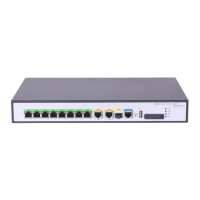191
snmp-agent calculate-password
Use snmp-agent calculate-password to calculate a digest for the encrypted from of an
authentication or privacy key in plaintext form.
Syntax
In non-FIPS mode:
snmp-agent calculate-password plain-password mode { 3desmd5 | 3dessha | md5 | sha }
{ local-engineid | specified-engineid engineid }
In FIPS mode:
snmp-agent calculate-password plain-password mode sha { local-engineid |
specified-engineid engineid }
Views
System view
Predefined user roles
network-admin
Parameters
plain-password: Specifies an authentication key or privacy key in plaintext form, a case-sensitive
string of 1 to 64 characters.
mode: Specifies the same authentication mode and privacy mode as configured in the snmp-agent
usm-user v3 command. The encryption algorithms AES, 3DES, and DES are in descending order of
security strength. DES is enough to meet general security requirements. The MD5 authentication
algorithm is faster than SHA-1, while SHA-1 provides higher security than MD5.
• 3desmd5: Converts the plaintext privacy key to an encrypted key for 3DES encryption used in
conjunction with MD5 authentication.
• 3dessha: Converts the plaintext privacy key to an encrypted key for 3DES encryption used in
conjunction with SHA-1 authentication.
• md5: Converts the plaintext authentication key to a ciphertext key for MD5 authentication, or
converts the plaintext privacy key to a ciphertext key for AES or DES encryption used in
conjunction with MD5.
• sha: Converts the plaintext authentication key to a ciphertext key for SHA-1 authentication, or
converts the plaintext privacy key to a ciphertext key for AES or DES encryption used in
conjunction with SHA-1 authentication.
local-engineid: Uses the local engine ID to calculate the ciphertext key. You can configure the local
engine ID by using the snmp-agent local-engineid command.
specified-engineid engineid: Uses a user-defined engine ID to calculate the ciphertext key. The
engineid argument specifies an SNMP engine ID as a hexadecimal string. It must contain an even
number of hexadecimal characters, in the range of 10 to 64. All-zero and all-F strings are invalid.

